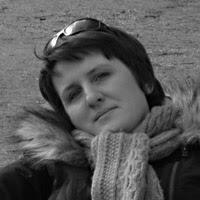Do you remember that a couple of weeks ago, in my brief review of "Foody Places in the 6th Arrondissement in Paris", I mentioned in a few words the great artisan butcher shop of Mr Jean-Pierre Bajon, located at 29, rue de l’Abbé Grégoire, between rue de Vaugirard and rue du Cherche-Midi. Right before leaving Paris, I had a one hour chat with him, during which he revealed some more information about this quite rare profession. I hope you will find it interesting, as this man is completely crazy about meat (probably he was born with a butcher knife in his hand). Mr Bajon is very French: he is absolutely convinced that French meat is the best in the World. I agree that all meat products in his shop are extraordinary; but on the other hand I must defend our Polish pink-red veal, which I love a lot, and which Mr Bajon does not have such a positive opinion of.
Mr Bajon, thank you for meeting with us in your back shop…
This is where I prepare lunch every day for my staff, and all of us have a bite together, peacefully.
It's a custom that we established because all of my colleagues live quite far away; this way, they don't have to commute at lunch time, they don't have to go to the restaurant, they just stay here, quietly and do whatever they want during their break. They also can watch TV if they wish. Then, at 3:30 pm, we go back to work. I live on the second floor (there is a staircase that connects directly to his apartment). So, go ahead, ask all the questions you wish!
Were you always here, in this shop?
I arrived here in 1982. When I revived this business which was bankrupt – it had completely gone down – I instantly liked this neighbourhood; it was quiet and business picked-up right away. So I stayed in this shop and 10 years later, I realized that I had built a reputation and thought it pointless to move anywhere else. It made more sense to remain here, and to pursue my career in this place that I liked so much. I did not find it necessary to change something that was working really well.
Further, my children were really young at that time and it was important for me to see them at lunch time. It was like in the old days, in an old fashioned butcher shop. This was especially important to me.
In fact, I feel that today my career rather is behind me (I will turn 56 soon) and I like it a lot here. It still is a small family butcher shop, like in a village although we are located in the heart of Paris. It's very friendly and we are lucky to be able to do a good job. The quality of the meat is outstanding and we provide a good service to our clientele. You know, what is really important is to be attentive to our customers. We are close to them, they chat with us and tell us their stories, but we are not nosy and, unlike what happens in the countryside, it does not go any further...
How did you enter this profession?
My parents were in the countryside, they were farmers, and when I was very young I already wanted to become a butcher; I always had an attraction to this profession.
In the Paris area?
No, I started in the Sarthe Region, In La Ferté-Bernard were I did my apprenticeship for 2 years. Then in 1972, I came to Paris where I did my entire career. These were really good moments of life and it is unfortunate that time flies so fast!
The quality of the meat is outstanding here; how do you choose your products and your suppliers?
At the beginning, it was quite complicated to find good products; I had to build my reputation. Nowadays, things have become much easier: breeders approach me and call me to say "I have an outstanding animal". I only accept the animal when it suits my requirements. This applies to beef, veal, lamb, pork and poultry.
Do you purchase your meat straight from the producers or do you go to Rungis?
In the past, I would go directly to the producers, but it was too complicated and it required a huge amount of work. During the past 15 years, new norms have been applied to the transportation of meat and to slaughterhouses regulations which have made getting supplies directly from the producers even more restrictive. Today, animals are first conveyed to the slaughterhouse by their breeders; they are then shipped to the Rungis central market to be sold.
I practically go to Rungis every day: on Mondays, Wednesdays, Thursdays and from time to time on Fridays as well; at least 3 or 4 times per week.
Generally, we go there for the opening of the market (we leave at 4:00 am or 4:30 am) because, should it happen that the meat that I requested does not suit me, the producer should be able to sell it there; it happens sometimes, although rarely.
Do you personally check the meat?
Yes I do, nobody does this on my behalf.
What are your selection criteria?
It's the result of experience, with the touch and the eyes.
This is something that was taught to me and that I developed on my own. I have a gift for choosing the products, for watching carefully whether the meat is sound, greasy enough and that's important because we only carry greasy meats here, no lean meats. That's the type of meat that our customers prefer and we only trim the fat off when a client specifically asks for it.
What is the origin of this meat?
I exclusively carry French meat, and I am very cautious about that, even when foreign meat can be up to 3 times cheaper that the French one, I do not buy any. And this is something very important.
Can we say that the meat you sell is natural?
Absolutely, it comes from free range, pasture-raised animals. I only carry veal from calves suckled by their own mothers, and that have always been kept in the dark.
Good veal meat comes from calves which do not see daylight because should they start grazing grass, their meat will not remain white and will turn quite pink or even slightly red. This is why there are some places in the provinces, Corsica for example, where free range calves will provide red meat, as opposed to the one we work with here, with a complete different taste. Parisians in particular, like this white meat and always ask for it.
What about your poultry? Are your chickens hormones-free? Do you carry Bresse chicken?
We sell a lot of poultry from the Bresse Region: chicken, Guineafowl and several others, and free range chicken as well, pasture-raised and well fed.
We exclusively carry free range poultry and beef.
As regards game, the season starts in September and ends in January. The hunting season lasts 3 months. In October, November and December, we sell a lot of game.
You also confection some products such as Terrines and Rillettes?
Yes, we get our supplies from a small producer of charcuterie (prepared meat products) however when he cannot provide me with the items I want, I make them myself. In that context we prepare our own rabbit rillettes, paupiettes (stuffed veal escalopes), salads and also ready-to-cook veal roasts, or "veal in pastry dough" (which consists of a nice veal roast that is flattened, we add raw ham, ground pork meat, mushrooms and reshape the roast). We make Italian Veal, Veal Roast with Sweetbread, Roast with kidneys and many other sorts of roasts.
You also carry sausages, andouillettes, hams...but do you make the ham with herbs here?
No, I get it from this producer who makes the white ham and part of my charcuterie, such as my blood sausage, my andouillettes, my sausages from Morteau, from Montbéliard, my Knackwurst (saucisses de Francfort). This charcutier does not like to be in contact with customers but he likes to work with products of good quality. He exclusively works for butchers and in the Paris area, he supplies a good 30 of them.
Is it possible to place unusual orders?
Yes we can work on any preparation you wish but we do not cook them here because we do not have the equipment and fixtures to do that. When a customer requests an Osso Buco, a Blanquette (veal stew), a Veal Roast with pistachios, a Veal Orloff, we can deliver!
Who are your customers? People from the neighbourhood? Any famous people?
Yes we see a lot of important people here and a lot of actors who, for the most part are epicures, who like to eat!
We have Jospin, we had Mitterrand, we have Arditi, Depardieu, we had Sardou... a lot of people from the entertainment business.
All these people come here early in the morning, so they are not bothered. They are attached to artisanal butcher shops like ours and they like to choose their products. Our job is particular, it's about preparing and cutting, it's artisanal.
I also have a lot of clients who come from the suburbs. About 50% of our clients live in the neighbourhood and the other 50% make the trip from the suburbs to our shop once a week, because of my reputation. They buy enough for 8 or 15 days and store the food in their freezers.
Are there lots of butcher shops like yours in Paris?
We are about 10 butchers of this quality in Paris, where you can find a total of 450 butcher shops. It is a fact that people in our neighbourhood have a higher per capita income compared to other parts of Paris. But there are lots of places in Paris and in the suburbs where people would like to have shops like ours.
There is a huge shortage in artisan butchers like us and it is unfortunate that there are not enough individuals curious enough to enter our profession which offers of real potential for success.
To become a butcher, or a charcutier for example, one needs a good level of education, and courage!
Unfortunately, it is not the case and I notice it in professional schools where I am a jury. The National Education System throws, into these manual professions, young candidates and apprentices who are failing at school. I think it is a shame! And I fight hard to change that.
However, I do not teach (in schools) because I am not patient enough for that, but I train young apprentices in my company.
How difficult is it to become an artisan butcher?
It is not difficult at all. When one enjoys working with meat I think that it is quite easy, following an apprenticeship. The most difficult part of our profession is to select the meat; this is where one needs a specific training to choose the meat carefully and you have to be cautious every day.
I am sure that you received many medals….
Yes, I received numerous medals, gold ones, bronze ones, I received a medal form the City of Paris, and another one again last year. Medals are alright but the most important thing is to remain humble, to remain the same person. Nothing should ever be taken for granted in life, except the opportunity to look at yourself in the mirror every morning and to tell yourself that you can always do better!
You had a Polish apprentice. How did you happen to hire him?
It happened that this youngster came from Poland for a traineeship and had to find a tutor or a business owner in light of spending 5 or 6 days a week in the company. This young Polish apprentice spent 1 year here with me and really enjoyed it. When he wanted to go back to Poland I told him "André* if you leave, I am not sure whether I will be able to hire you again later", and he ended up regretting that he left. He was missing his family and his country a lot. Later on, he called me to ask if he could come back to work here but my staff was full and I could not hire him again. He regretted it but we remained in good terms. He had a good level of education and was learning really fast; he was a very good employee.
André's parents already had their business in Poland and he was quite aware about working with meat. It was therefore very interesting for him to learn about French techniques.
Have you tried Polish charcuterie? What did you think of it?
The preparations are really outstanding but we do not have the potential to sell them here because in Paris, there no demand for this type of products. What is typical with Polish charcuterie is that it is not prepared from quality pork, and you can notice this instantly. Here people prefer our good French charcuterie!
Have you ever been to Poland?
Yes I went there 5 years ago. I went to Krakow, to Auschwitz, and André took me around a part of the country. I only went there for 1 week, which is way too short; one should spend much more time to visit the country.
*Andre – Andrzej Mądry, son of Stanisław Mądry, probably the most famous slow-foody producer of “kiełbasa lisiecka” – a smoked “Lisiecka Sausage”, made from pork’s ham. The name of the sausage comes from the name of a small town close to Kraków – “Liszki”. Actually, the best and artisanal “lisiecka sausage” is made by Stanisaw Mądry a few kilometres away. This sausage won a lot of national awards and has been presented as our export product during some artisanal food festivals in Italy, Spain and Great Britain. Mr Mądry does other good charcuterie, too (I do not agree with Mr. Bajon that we do not have any quality pork!). Except for events such as food festivals, one can hardly find this sausage in regular trading (however, this product made by other producers is available). More about Stanisław Mądry and his son, Andre, in coming posts.













20 comments:
How adorable! Such a cute post :o)
Nigdy jeszcze nie kupowałam mięsa w Paryżu, ale jak spełnię swoje marzenie i wynajmę tam mieszkanie na dwa tygodnie, to jestem pewna, ze pójdę do polecanego przez Ciebie miejsca. Czekam na post o kiełbasie lisieckiej. Kiedyś zawędrowaliśmy do Liszek po zakupy najlepszej. Niestety w sklepach zdażają się kiełbasy pod tą nazwą, ale mające mało z nią wspólnego. Pozdrawiam.
What a charming man! :) It is good to have somebody like him around when shops are packed with poor quality meat and there is nobody handy to recommend cuts or the best preparation.
Have a nice weekend Magda!
I enjoyed reading your post, I'm very happy to be following your site. I'm interested in all aspects of french food and you really give us an in depth look at the daily workings of a butcher shop in Paris which I find very well researched and written. Also great pictures which give the story a nice personal touch. I also like seeing the story from your Polish perspective and look forward to reading about Stanislaw Madry and his son, Andre.
Meat-eaters' Ha(e)ven!
Too bad though that such places are so few and far between, as we're beeing progressively surrounded by bad-quality meat, already cut (in many cases removing the best parts in the process, out of ill-conceived concept of what's best for your health - like "lean stewing beef", what a load of nonsense), pre-packed and sold to the masses at supermarkets. If things go in that diriection, than I'm affraid only the rich will be able to afford real meat, while the rest will have to settle for so-called animal derivatives and other such things that they put in dog food nowadays. Or is it only the DOG food?
No wonder so many people convert to vegetarianism. But, on the other hand, I think that for centuries good-quality meat was the birthright of the very few.
Excellent interview, Magda. Keep'em comin'!
Niesamowity post Magda ! I bardzo pouczajacy - pierwszy raz slysze o kielbasie lisieckiej! Juz po posadzce, ktorej widac troche na pierwszym zdjeciu, widac, ze to niesamowite miejsce z niesamowitym klimatem. Mam troche fiola na punkcie tych starych plytek cementowych ;))
A Rungis kiedys odwiedzisz i pokazesz ?
Pozdrawiam serdecznie !
Ach ten zestaw nozy - piekny!
How interesting to read about this man who is so dedicated to his profession!
By the way, I would love to get acquainted with Polish veal; in the US, there is no veal to save my life, and I missed it all these years.
In Polish:
Lo – a moze chcesz wynajac na miesiac caly ? Na dwa tygodnie trudno bedzie, a poza tym jest tyle miejsc zwiazanych z jedzeniem do obejrzenia, jak sama wiesz, ze czasu Ci nie starczy, jezeli przyjedziesz tylko na dwa tygodnie :)
Pana Bajon odwiedz koniecznie. Sklep co prawda nie wyglada imponujaco, jak wiekszosc tego typu miejsc, ale zareczam, ze mieso u niego warto sprobowac. Jeżeli chodzi o kiełbasę lisiecką, to dość trudno dostać w Polsce taką „niemodyfikowana” – najlepsza jest właśnie u Mądrego, w Nowej Wsi Szlacheckiej. Jutro tam jadę z wizytą. Nie wiem tylko, czy produkty jego można gdzieś dostać w sprzedaży detalicznej – podobno całość produkcji idzie do restauracji i na festiwale smaku. Dowiem się i dam Ci znać. Oprócz tego dobrą lisiecką można dostać podobno w dość znanym sklepie przy ul. Zwierzynieckiej oraz przy Kleparzu – w sklepie „Swinka Piggy” (glupio sie nazywa, ale to jeden z lepszych miesno – wedliniarskich w Krakowie; maja rowniez oryginalnego Kindziuka i inne takie).
Miss-coco: Miejsce jest rzeczywiscie klimatyczne – zarowno poadzka, jak i stare lady oraz fartuchy rzeznicze. Rungis chcialam pokazac juz wczesniej, mielismy sie tam wybrac nie raz i nie dwa, ale problem w tym, ze trzeba jechac o piatej rano i o tej porze nie mamy z kim dziecka zostawic (niestety jest w takim wieku, ze lepiej jej nie zabierac – zwlaszcza nad ranem – w miejsca publiczne). Nie jestem tez przekonana, czy mozna tam robic zdjecia – nie bylabym zdziwiona, gdyby nie. Odwiedziny mam w planie – pewnie na jesieni albo w zimie.
Kielbase lisiecka raczej trudno dostepna w innych czesciach kraju, z tego co mi wiadomo.
In Polish...
Basiu - a zebys widziala, jak te noze szybko tna ! Lepiej, zeby nie dostaly sie w niepowolane rece...
Oh, I love meat markets like this! Gorgeous photos and wonderful interview!
No nareszcie ,przeczytalam do konca.
To sie nazywa miec znajomosci !!!!
Ale z pana rzeznika zatwardzialy nacjonalista. Liczy sie tylko francuskie miesko :-)
Milego pobytu w kraju.
@ anthony: No ba! Nie bez kozery słowo szowinizm z francuskiego się wywodzi. ;o)
This was so interesting. You rarely find people so proud of and dedicated to their work. I thought your interview was fascinating. I really love to visit your blog. There is always something new and unique here. I hope you are having a great day. Blessings...Mary
What a great informative post! I ashamedly admitted that I've never been a butcher shop and I really want to - to learn about different kind of meats. I don't even know where to go in the city where I live**sigh**
He seems so kind and takes good care of what he sells. Great post and photos!
@ szalony kucharz: w coraz to nowych laszkach Cie widze :-)
Magda wybacz prywatna korespondencje:-)
Spoko Anthony, jeszcze nie mialam czasu odpisac na wszystkie komentarze, ale czytam je. Z pan rzeznik jest zakochany we francuskim miesie, to fakt. Tak jak wloski we wloskim, a hiszpanski w hiszpanskim itd. A nasza prega cieleca najlepsza jest, o :)
Karolina: he is charming, yes, and that is why I forgive him his absolutely subjective and not always right opinions about meat from other countries. The best about the shop is that they perfectly know the cuts and all preparations; they always advise you how long to bake or cook your meat.
Patty, I hope that you will find a bit interesting reading stories from Poland. Tomorrow, you will find a story from a nice place, where I spent last weekend. Today I met Andre, a son of this Stanislaw Madry. I got their sausages and charcuterie and in a week or two I will go there again to see how the sausage is made, so certainly I will write about that. Thanks for warm words !
Kucharz: In France they still exist, in Italy, Spain and other countries…what a pity that in Poland they usually cut the meat like a piece of wood. I had a chat today with this Andre, who spent one year in a shop of Mr. Bajon, learning how to cut the meat properly. In his opinion, in our region one will not find any single butcher shop like this. Will it ever change? Good quality meat is awfully expensive everywhere and to some extent it is already a luxury product. Many people convert to vegetarianism, but if you want to enjoy organic vegetarian dishes, you can spend a fortune, too. In general good quality food becomes more and more expensive; even butter, milk – everything !
Joumana, thanks. I will try to prepare one dish with Polish veal. It is completely different in comparison with that one from Mr. Bajon shop: its color, texture and taste.
Mary, I will not lie that he is absolutely crazy about his profession… this Polish guy, who was working in his shop, confirmed today (I met him) that Mr Bajon is very nice and warm guy. Have a nice evening…
Tanatha: because it is not so easy to find a good butcher shop nowadays…he is kind, and he always leaves the best pieces of chicken or veal for our daughter
Emily, A Spicy Perspective, thanks.
I love interviews to "artisans". It is where we have the real feel...
In any case, I have my reservations about all meat in France being "only" from grass-fed animals...You need a country with a more temperate climate...What "grass" do you find in the middle of the French winter??
French meat is good, very good, but Argentinian meat in much better!
Cristina, thanks for reading carefully. Probably he meant fresh green grass and hay in winter (no modified feeding stuff). Probably you are absolutely right about Argentinian meat. I did not eat eat many times in my life, but I tried and it was outstanding. My friends who visited Argentina became absolutely crazy about your meat and milk products.
Post a Comment